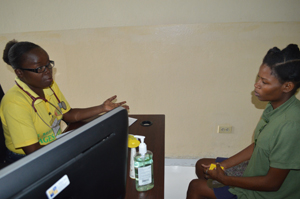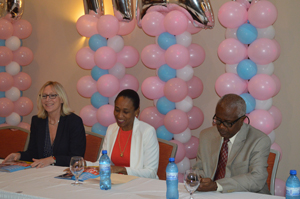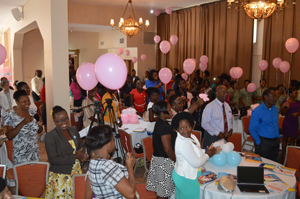
Port-au-Prince, May 6, 2016 --- More than one hundred women and newborns received care at OFATMA hospital, northern part of Port-au-Prince, May 4, 2016.
The Association of Nurse-Midwives of Haiti (AISFH in French), with the support of the Ministry of Public Health and UNFPA, organized this activity as part of the celebration of the International Midwives Day.
Naïka Paressa, 24 years and 6 months pregnant, praised the initiative. "I came here because of abdominal pains. They received me well, they gave me a card, they auscultated me and gave me medication. The baby in my belly, is fine."
Patients were pregnant women, women who gave birth less than 3 monts ago and women with gynecologic problems, stressed the midwife in chief of the OFATMA maternity (Office of Insurance, Labor Accidents, Disease and Maternity).
“We also provided education sessions for pregnant women and women who gave birth, as well as delivery preparation courses to women who are on the verge of giving birth”, adds Jeanne Lucia Salvador.
After the consultation and education sessions, the women received medication, baby items, birth kits, mosquito nets and toiletries.
Moreover, the AISFH has officially launched the international color of Midwives in presence of the Minister of Public Health and Population (MSPP), Dr Daphnée Benoît Delsoin.

The Minister, at this commemoration workshop of May 5, highlighted the need to continue to advocate so that everyone can understand the contribution of midwives in maternal health and neonatal care.
Bringing the rate of institutional delivery to 80% (against 36% currently) and the maternal mortality ratio to below 70% (350 / 100,000 live births currently) is the objective that we must determine, according to Dr. Delsoin.
Despite obvious progress, Haiti is still far away behind its neighbors in the Caribbean basin and the continent, regarding health indicators (percentage of institutional delivery and maternal mortality ratio in particular).
The UNFPA Representative has, for her part, urged countries, regarding midwives, to invest in quality training, good working conditions, decent wages, adequate human resources policies and opportunities for professional development. Marielle Sander resumed here the appeal made by the Executive Director, Dr. Babatunde Osotimehin, on the occasion of the International Midwives Day.
UNFPA supports training and thousands of midwives in over one hundred countries. A recent survey showed that in fifty-seven of these countries, UNFPA helped train sixty-eight thousands of midwives in the past seven years.
In Haiti, UNFPA is supporting the Ministry of Health in the basic training of midwives and the continuous training of midwives teachers. In addition to the technical and financial support for the training of midwives, UNFPA is advocating for the deployment of midwives in the BEmONCs of the country, four of which are supported technically and financially by UNFPA.

The BEmONC maternities (Obstetrical Neonatal Emergency Care) are among the five strategic areas identified by the Ministry of Health to create a medical service network to serve remote areas across the country.
UNFPA has been honored, three years ago, by the Association of Nurse-Midwives for its significant contribution to the advancement of midwifery project, considered, by MSPP, as the Gateway of the health system in Haiti.
According to the MSPP, the country would need at least 1,500 midwives to significantly reduce the number of women dying during pregnancy or childbirth. The 250 midwives currently spread across the country are not enough to provide the care that these mothers are entitled.

